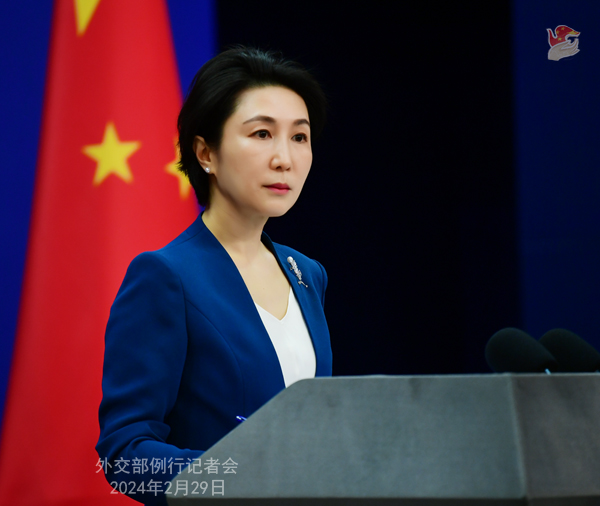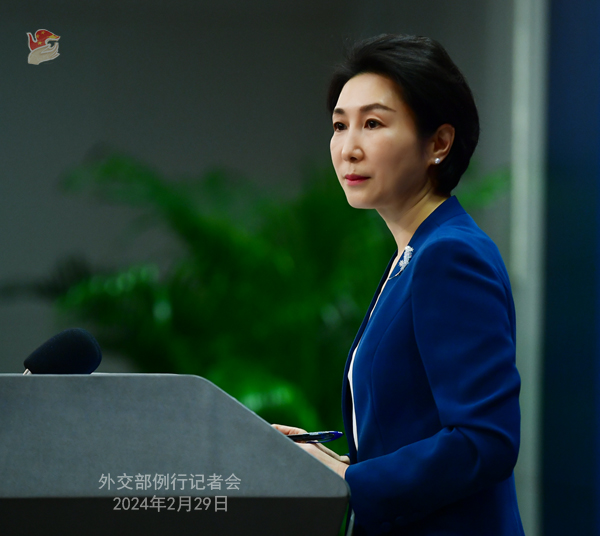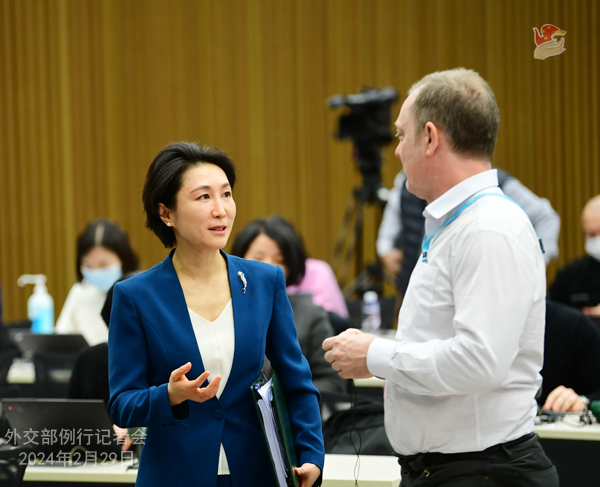
Shenzhen TV: It’s reported that in a statement released on February 28, the UK Foreign Secretary David Cameron said that Hong Kong Special Administrative Region (HKSAR) government’s legislative proposals on Article 23 of the Basic Law do not uphold the obligations of the Sino-British Joint Declaration, which will have a negative impact on the people of Hong Kong in the exercise of their rights and freedoms and a risk that the work of international organizations in Hong Kong could be labeled as “foreign interference”. The UK strongly urged the HKSAR government to re-consider their proposals and will monitor development of this legislation closely. What’s the Ministry’s comment?
Mao Ning: The UK’s statement is a gross interference in China’s internal affairs and Hong Kong affairs, which lays bare again its deeply entrenched colonial mindset and mentality as a “lecturer”. China firmly opposes it.
The UK’s “concerns” have no ground. First, the Sino-British Joint Declaration by no means put the UK in a position or gave it any right to interfere in Hong Kong affairs. Second, one of the principles that guide the legislation on Article 23 of the Basic Law is to respect and protect human rights, and protect in accordance with the law the rights and freedoms which the residents of Hong Kong enjoy under the Basic Law and the provisions of relevant international covenants as applied to Hong Kong. Third, there is a clear line drawn between acts that constitute an offence that endangers national security, and normal commercial exchanges and activities in the fields of economy, culture and science and technology. The normal activities of foreign institutions and personnel in the HKSAR will continue to be protected in accordance with law. It’s worth pointing out that the UK’s National Security Act that came into force last year contains many provisions with vague definitions and grants law enforcement agencies sweeping power, which can be easily abused.
We urge the UK to find the right mindset, face squarely the fact that Hong Kong has already returned to China, stop interfering in Hong Kong affairs, reflect on its action, and end double standards.
Hubei Media Group: The latest data shows that the China-Europe Railway Express made over 85,000 trips in cumulative terms, effectively boosting the development of countries along the routes. What’s your comment?
Mao Ning: The China-Europe Railway Express is a flagship project and distinct brand of Belt and Road cooperation. After a decade of ground-breaking and innovative efforts, the China-Europe Railway Express has kept adding new lines and expanding its capacity, providing the Eurasian continent fresh corridors of land transport and new bridges for economic and trade cooperation. Over the past 10 years, along the routes of the China-Europe Railway Express, customs clearance and inspection has been streamlined, the business environment at ports of entry has been improved, and rules and regulations for cross-border transportation have become more standardized. Thanks to the China-Europe Railway Express, China enjoys closer cooperation and more robust trade ties with Central Asia and Europe. A large number of companies specializing in international trade, smart manufacturing, and supply chain service have established presence along the routes. Industries such as manufacturing, trade and commerce, finance and information have been constantly upgraded. More and more European products have entered the life of the Chinese people, while “Made in China” is becoming more popular in Europe.
President Xi Jinping announced at the Third Belt and Road Forum for International Cooperation that China will speed up high-quality development of the China-Europe Railway Express, which has been actively supported by countries along the routes. In 2024, we believe the China-Europe Railway Express will continue to run at full speed and inject new impetus into the development of the Eurasian continent.
Antara: The Qatari mediators propose Israel to pause its war on Hamas in Gaza during the upcoming Muslim fasting month of Ramadan. Will China also join Qatar’s proposal and put more effort to stop war during Ramadan?
Mao Ning: As the conflict drags on, the dire humanitarian situation continues to worsen in Gaza. The international community must act now and focus all efforts on bringing about a ceasefire and protecting civilians. China supports all diplomatic efforts conducive to deescalation and easing the humanitarian crisis. We call on all parties concerned to stop fighting immediately, do everything possible to prevent casualties among innocent civilians and prevent an even worse humanitarian catastrophe.
Bloomberg: We’ve seen reports that Wang Yi will head to Australia. Can you confirm this or do you have any details?
Mao Ning: With the concerted effort of China and Australia in recent years, the bilateral relationship has returned to the track of sound and steady growth. China values the growth of its relations with Australia and stands ready to work with Australia to deliver on the important common understandings between leaders of the two countries, enhance exchanges across the board and at various levels, cement mutual trust, promote cooperation, handle differences properly and advance the China-Australia comprehensive strategic partnership. On your specific question, I have nothing to offer at the moment.
TASS: Starting from March 2, Special Representative of the Chinese Government on Eurasian Affairs Li Hui will visit Russia, the EU headquarters, Poland, Ukraine, Germany and France. What are the important plan and arrangement of Li Hui’s trip to Russia?
Mao Ning: The protraction of the Ukraine crisis does not serve the common interest of the international community. The main objective of the upcoming round of shuttle diplomacy is to build consensus for ceasefire and pave the way for peace talks. China stands ready to continue to play its role and contribute China’s wisdom to seeking a political settlement of the Ukraine crisis.

Bloomberg: President Xi Jinping told Sierra Leone’s President on a visit to Beijing that the two nations should boost their coordination in the UN Security Council and jointly secure the interests of Africa and developing countries. This appears to be China’s latest effort to be seen as a leader of Global South nations. Would the Ministry like to provide details on how China plans to protect the interests of Africa and developing nations in this leadership role?
Mao Ning: As a developing country, China, a natural member of the Global South, has invariably stood in solidarity with fellow developing countries through thick and thin and firmly upheld the common interests of developing countries. President Xi Jinping has put forth important strategic guidelines and policies to consolidate and deepen our relations with fellow developing countries. We follow the principle of sincerity, real results, amity and good faith and the principle of pursuing the greater good and shared interests, and firmly uphold sovereignty, independence, the principle of non-interference in each other’s internal affairs, and the legitimate rights and development opportunities of developing countries. We call for an equal and orderly multipolar world to make the international order more just and equitable and to raise the representation and say of developing countries. We call for a universally beneficial and inclusive economic globalization to share opportunities with other developing countries for common development. China will always stand together with developing countries, work toward building a community with a shared future for mankind, advance together the Global Development Initiative, the Global Security Initiative and the Global Civilization Initiative, pursue high-quality Belt and Road cooperation, apply the common values of humanity and work for a peaceful, safer and prosperous world with a bright future.
Dragon TV: According to reports, the Japanese government protested against the ROK court’s ruling which orders a Japanese company to compensate victims of forced recruitment of laborers during World War II. The Japanese Foreign Minister expressed strong regret to the ROK Foreign Minister on the sidelines of the G20 Foreign Ministers’ meeting. There are media comments saying that despite the improvement of ROK-Japan relations in the past two years, the Japanese side still maintains its erroneous attitude toward historical issues and even becomes more arrogant. What’s China’s comment?
Mao Ning: Forced recruitment and enslavement of laborers is a grave crime against humanitarian law committed by the Japanese militarism during its aggression and colonial rule against the people of Asian nations, including those of China and the ROK. The facts are backed by ironclad evidence and shall not be denied or altered. China has long asked the Japanese government to properly handle relevant issues left over from history with an honest and responsible attitude. Japan needs to face squarely and reflect on that part of history, and show remorse for its historical crimes and respect for the victims through concrete actions. Japan also needs to shape a correct view of history among the younger generation. Only by doing so can Japan truly earn the trust of its Asian neighbors and the wider international community.
PTI: Foreign Minister Mr. Wang Yi yesterday met the UN officials in charge of reforms, especially the UN Security Council reforms. There was a readout issued by the Ministry. Several emerging economies, including India, have criticized China, holding it responsible for blocking the reforms in the UN Security Council. I just would like to ask you have there been any concrete proposals put forward by China with regard to the reforms, especially of the UN Security Council?
Mao Ning: The reform of the Security Council is an integral part of the reform of the UN as a whole. China supports necessary reform of the Security Council so that it can better fulfill its important responsibilities of maintaining international peace and security and better respond to major global challenges in today’s world. We believe that the reform of the Security Council should effectively increase the representation and say of developing countries and give more small and medium-sized countries the opportunity to participate in the decision-making of the organization. Upholding solidarity and cooperation of the international community should be a priority and member states need to seek the broadest possible consensus for a package solution through serious and thorough consultations. The reform should benefit all member states, rather than serving the selfish interests of a few.
Bloomberg: President Joe Biden signed an executive order designed to prevent foreign entities from accessing troves of American personal data. This is amid worries that it could be exploited for commercial and military advantage, particularly by China and Russia. Does the Foreign Ministry have a comment on this?
Mao Ning: The US overstretches the concept of national security, falsely accuses China of purchasing Americans’ personal and sensitive data for malicious activities, and prevents the transfer of data to so-called “countries of concern” including China. These are discriminatory practices clearly targeted at certain countries. China firmly rejects these measures. The Chinese government takes data privacy and security very seriously. We have never asked and will never ask any company or individual to collect or provide data, information or intelligence located abroad against local laws for the Chinese government. We put forward the Global Initiative on Data Security. If the US truly cares about data security, it can publicly endorse this initiative or make similar commitments. We urge the US to stop smearing and discrediting China, effectively safeguard a fair, open and non-discriminatory business environment, and work with others to formulate universal data security rules to enable orderly and free data flows around the world.
Bloomberg: Australia and the Philippines have signed an agreement to boost collaboration on maritime security, including promoting respect for international law as they put it. This is the latest sign of their deepening defense ties. Do you have a response to this?
Mao Ning: The South China Sea is generally stable at the moment. Relevant countries’ maritime security cooperation should not undermine other countries’ interests or disrupt regional peace and stability.
PTI: One thing that you mentioned was that the system should not serve the selfish interests of a few countries. This is precisely where the criticism is about the Permanent Five. The entire system is geared up to serve the interests of these Permanent Five while the rest of the countries are left to defend for themselves.
Mao Ning: The UN is the broadest-based organization in the world and is therefore able to represent all countries in the world. I don’t think that the Security Council only represents the interests of the permanent members but there’s a need for necessary reform of the Security Council, so that developing countries and medium and small-sized countries can have more opportunities to take part in the decision-making of the Council. As for how the reform should be carried out specifically, this will require serious and full consultation among UN members and accommodation of the concerns of all countries so that all members will benefit from the reform.


